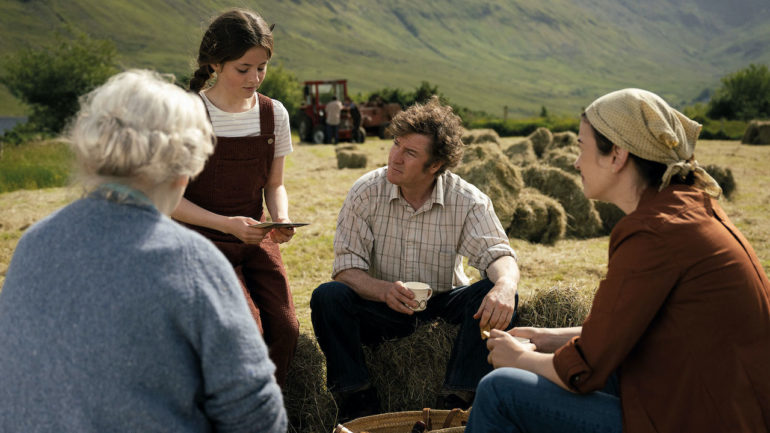The cinema of Pat Collins is defined by thoughtfulness and calm. Whether making a documentary or a narrative feature, consideration goes into every frame’s meaning, and each scene unfolds at its own unhurried pace. Collins’ oeuvre could be categorised as ‘slow’ cinema, but that tag has the potential to undermine what the films try to say. In Collins’ latest, That They May Face The Rising Sun, the slow pace doesn’t change the fact that people are busy, lives are being led, and emotions are being deeply felt.
Collins profiled novelist John McGahern in a 2005 documentary, but he had to have seen the potential for a film in McGahern’s final novel. As with his 2012 feature Silence, this film centres on an ex-pat returned to Ireland, and confronting what that land holds for him. In late 1970s Ireland, Joe Ruttledge (Barry Ward) has moved back to the rural lakelands of home with his wife Kate (Anna Bederke). He is a writer, she an artist, and they have set up a handsome little corner for themselves at the end of a grass-verged bóithrín. In between bouts of writing, Joe farms a little to maintain some income. He rears sheep, keeps bees, and is building a greenhouse. Both McGahern and Collins (alongside co-writer Éamon Little) make a link between the life of a country farmer and that of the artist. It’s hard work, but there’s dignity and fulfilment to be found in it. To convey that dignity, Collins puts the characters to work in the middle of stunning Irish landscapes. DoP Richard Kendrick dapples them in sun to make the greens pop and the waters shimmer.
For all the handsome locations and old-style cottages on display, what marks this story’s time and place most accurately are the traditions in which the characters partake. Most notably, Joe and Kate play host to a variety of visitors. In a time before widespread use of telephones or television, the locals pop in for a visit, to exchange gossip and solve the world’s problems over tea or a meal. Bill (Brendan Conroy) takes breakfast before filling buckets from the nearby stream, because he has no running water, while Patrick (Lalor Roddy) does odds jobs for whoever will have him. The plight of these old bachelor boys will be recognisable to any Irish person of a certain generation. The likes of these men, who never left home, and never found work or love, offer a warning. Their loneliness is the dark side of rural life, defined by alcoholism and a lack of purpose. Collins doesn’t avoid or sugarcoat this reality; the countryside is undeniably beautiful, but opportunities for the likes of these are few. The educated Joe and Kate stand in contrast to many of their neighbours. Neighbours Jamesie (Philip Dolan) and Mary (Ruth McCabe) are neither wealthy nor well-read, but they are happy, and full of wisdom of their own. Watch as Jamesie inaugurates Kate in the tradition of basket-weaving, another nod to the skills that kept rural communities ticking over once upon a time.
The simplicity of this way of life is the selling point of That They May Face The Rising Sun, and it’s what keeps Joe and Kate in situ. Yet, they can read the signs; they know that change is coming. They can feel it any time one of their visitors expresses newfound discontent. Jamesie admits that going to Mass is a matter of habit more than anything else, while the unkempt Patrick begins to lash out at his lot in life (“I’m just a jester to the crowd!”). New technologies and ways of thinking will soon encroach on this community and everywhere else, and the changes that come with them will be profound. The rituals that we witness here (A wedding here, a funeral there) are part of the lifeblood of the land. Anachronistic as these events might seem, they gather the people together in common practice and shared interest, and Collins invites us to mourn the loss of such gatherings, especially in an age that seems to harvest increasing disharmony. The title comes from the tradition of burying corpses facing east (That they may face…), and such conventions still carry a great deal of power, despite the rumblings of their practitioners.
Kate is feeling a pang for London and her old career as a gallery manager, while Joe wonders if his work is worth the move. Moments where he sits to write are accompanied by Ward narrating extracts from McGahern’s exquisite prose, both evocative and tender. Collins leads us to wonder if such beautiful work would be possible anywhere else. However, the pull of the country is always there. Jamesie’s brother Johnny (Seán McGinley) visits from England, yet feels as much a part of the country as his brother. He goes to the pub with Joe, but when Joe steps out for a smoke, Johnny says, “You wouldn’t leave me, Joe?” There’s the rub; Johnny may have left Ireland, but it hasn’t left him, and Joe might not be able to leave it either. That’s the power of home.
As with much of his other work, Collins demands patience from his audience in That They May Face The Rising Sun, but the rewards are well worth it. Embrace its rural pacing, and you’ll find a great beauty there.
That They May Face The Rising Sun has its Irish premiere at the Dublin International Film Festival in March 2024.

